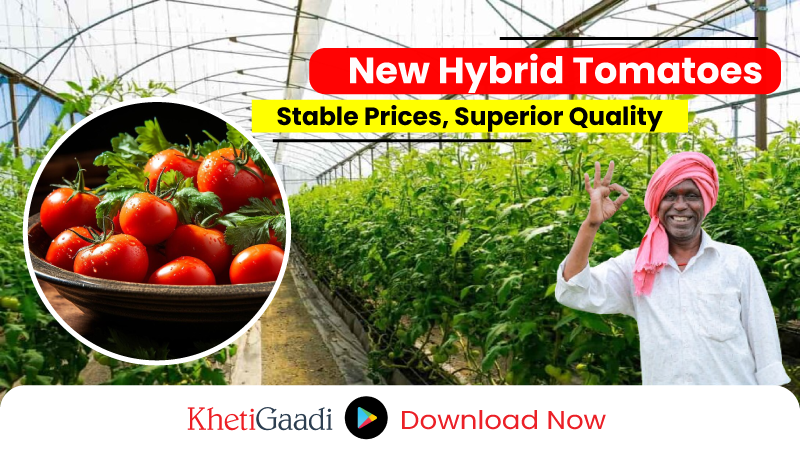Tomatoes: A Promising Solution to Monsoon Price Surges
In a significant development, the Indian Horticultural Research Institute has introduced new hybrid tomato varieties that could help stabilize the soaring prices of vegetables during the monsoon season. Heavy rains often lead to price surges for essential vegetables, particularly tomatoes. With inflation already a pressing issue, this breakthrough promises to benefit both consumers and farmers significantly.
KhetiGaadi always provides right tractor information
Skyrocketing Prices and the Hybrid Solution
During the monsoon, the price of tomatoes has skyrocketed, with costs jumping from Rs 10 to Rs 100 per kilogram. In response to this, the Indian Council of Agricultural Research (ICAR) has developed hybrid tomato varieties that could prove invaluable. If farmers embrace these new varieties, the general public might soon find relief from high prices, and farmers could see substantial benefits due to the extended shelf life of these tomatoes, which lasts up to three weeks.
Introducing Arka Rakshak and Arka Abedh
The Indian Institute of Horticultural Research (IIHR) has developed two hybrid varieties: Arka Rakshak and Arka Abedh. These varieties are notable for their extended shelf life of three weeks, compared to the 7-10 days typical for standard tomatoes. The potential impact of these tomatoes is significant, particularly in regions where heavy monsoon rains often destroy crops and lead to market shortages.
If you wish to know organic methods to increase your overall cultivation yield, please call KhetiGaadi counsellor on 07875114466 or write an email to connect@khetigaadi.com
Economic Implications
Himanshu Pathak, Director General of ICAR, highlighted the potential impact of these hybrids during the 96th Foundation and Technology Day of the institute. He emphasized that climate change is increasingly affecting the production of major vegetables such as tomatoes, potatoes, and onions. ICAR’s research focuses on increasing the shelf life of these crops to reduce supply fluctuations and price volatility.
The introduction of these hybrid tomatoes is seen as a strategic move to address these challenges. If widely adopted, these varieties could help stabilize tomato prices, ensuring a more consistent supply throughout the year.
Past Success and Future Potential
According to Chandrashekhar C, a senior scientist at IIHR, India’s first triple disease-resistant tomato F1 hybrid was developed in 2012 and is currently cultivated over 7,000 hectares. The hybrid technology, licensed to 11 companies, has generated an estimated turnover of Rs 3,600 crore from seed sales between 2012 and 2024.
This success story underscores the potential of hybrid technology in transforming agricultural practices and boosting economic outcomes for farmers. The new varieties, Arka Rakshak and Arka Abedh, hold similar promise, offering a robust solution to the perennial issue of price spikes during monsoon.
Broader Implications
The successful adoption of these new tomato varieties could pave the way for similar innovations in other crops, helping farmers combat the adverse effects of climate change. By reducing dependency on traditional varieties, farmers can enhance their resilience to unpredictable weather patterns and market fluctuations.
This initiative represents a significant step forward in sustainable agriculture, with the potential to improve food security and support farmers’ livelihoods. As India continues to innovate in agricultural research, these developments could serve as a model for other countries facing similar challenges.
Stay tuned with us on our WhatsApp channel for more real time updates on various agriculture related schemes and innovative cultivation methods aimed at supporting our hardworking farmers.
For more detailed information, visit https://khetigaadi.com/ regularly!
To know more about tractor price contact to our executive






